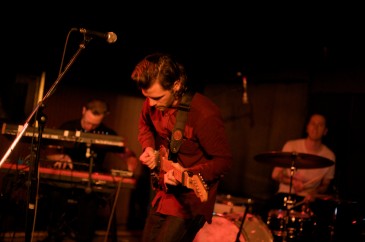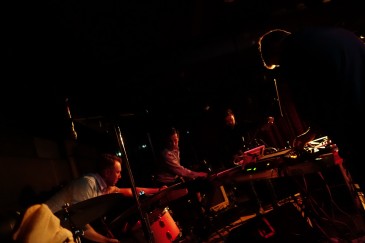
Amid the bumping of mid-set bathroom goers (never stand stage-right at the Media Club) Holy Hum began their opening, at times melodic but predominantly ambient, set. Frontman Andrew Lee’s voice was crystalline, his glassy vocals stretched with the sea of droning waves surrounding them. Together, these sustained notes spun the outline of a glacial soundscape. Vast with layers of synth, Lee strummed a relay between strings while a quickening drum rhythm led the song to shore.
The third song’s blipping beginning threw fast-dissolving nets out into the audience. Lee’s guitar rioted while wandering notes moved into a march. After a pause, the next tune tumbled forward in a light fall of chords. Behind a quaking drone, Lee called out like a wordless wind; each undiluted sound was ominous. There was no language in this finale, just the spread of a cold, blooming atmosphere.

Then the headliners took to the stage. Despite a familiar band composition-Christopher Smith (vocals/guitar), Shaunn Watt (drums), William Kendrick (synth/keys), and Peter Carruthers (bass)—Dralms soon proved to be more of a reinvention than a fresh moniker for Smith’s solo project. Playing to a crowded, unfortunately chatty room, Dralms’ second song was off their EP, Crush Pleats. Titled “Division of Labour,” it struck me as a hastened, synth-infused reworking of “Pillars and Pyre.” The trudging bass set a black scene for recurring key riffs to eerily flicker against. Adapting to their context, Smith’s placid words were shadowed and dripping with derision. Though his subject matter wasn’t fully decipherable, Smith’s final words, “if my heart had its will” seem to ache in inexplicable constraint and invoked Orwellian overtones.
Dralms went on to sing “Pillars and Pyre,” “Usage,” “Gang of Pricks,” and a cover of Fever Ray’s “If I had a Heart.” The final song, “Crushed Pleats,” was also from their recent EP. In a fog of drone the bass began. Howling gusts were slowly introduced. They haunted Smith’s tale of portent seduction as he sang, “Let your hair down. Little birds come tumbling to the ground.” Though hyperbolic, the imagery he invoked was disturbing. It added harrowing chaos to the already amassing sound.
As Smith repeated exhaustively “Ain’t I a lucky boy?” his rhetoric was engulfed in a synth-drenched swirl. Heavier than sarcasm, his words were weighed down by an oppressive and sinister force. As if to affirm this, the stage lights flashed in apocalyptic fury. The entranced band had trapped themselves in their own sound.
On this dismal Wednesday night, Dralms depicted a world of dark restraint. There was something dystopian in the hollows of Carruthers’ cavernous bass chords and the weaving electronic textures suggest a mechanized future where what seems good and pure is only artificial. In Dralms, Smith’s voice is not virtuously perfect, but inhumanly flawless.

